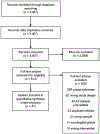A systematic review and meta-analysis of effects of psychosocial interventions on spiritual well-being in adults with cancer
- PMID: 34602807
- PMCID: PMC8485897
- DOI: 10.1002/pon.5562
A systematic review and meta-analysis of effects of psychosocial interventions on spiritual well-being in adults with cancer
Abstract
Objective: Spiritual well-being (SpWb) is an important dimension of health-related quality of life for many cancer patients. Accordingly, an increasing number of psychosocial intervention studies have included SpWb as a study endpoint, and may improve SpWb even if not designed explicitly to do so. This meta-analysis of randomized controlled trials (RCTs) evaluated effects of psychosocial interventions on SpWb in adults with cancer and tested potential moderators of intervention effects.
Methods: Six literature databases were systematically searched to identify RCTs of psychosocial interventions in which SpWb was an outcome. Doctoral-level rater pairs extracted data using Covidence following Preferred Reporting Items for Systematic reviews and Meta-Analyses guidelines. Standard meta-analytic techniques were applied, including meta-regression with robust variance estimation and risk-of-bias sensitivity analysis.
Results: Forty-one RCTs were identified, encompassing 88 treatment effects among 3883 survivors. Interventions were associated with significant improvements in SpWb (g = 0.22, 95% CI [0.14, 0.29], p < 0.0001). Studies assessing the FACIT-Sp demonstrated larger effect sizes than did those using other measures of SpWb (g = 0.25, 95% CI [0.17, 0.34], vs. g = 0.10, 95% CI [-0.02, 0.23], p = 0.03]. No other intervention, clinical, or demographic characteristics significantly moderated effect size.
Conclusions: Psychosocial interventions are associated with small-to-medium-sized effects on SpWb among cancer survivors. Future research should focus on conceptually coherent interventions explicitly targeting SpWb and evaluate interventions in samples that are diverse with respect to race and ethnicity, sex and cancer type.
Keywords: cancer; interventions; meta-analysis; psycho-oncology; randomized controlled trials; spiritual well-being.
Figures
Similar articles
-
Effects of psychosocial interventions on meaning and purpose in adults with cancer: A systematic review and meta-analysis.Cancer. 2019 Jul 15;125(14):2383-2393. doi: 10.1002/cncr.32078. Epub 2019 Apr 29. Cancer. 2019. PMID: 31034600 Free PMC article.
-
Technology-Assisted Psychosocial Interventions for Childhood, Adolescent, and Young Adult Cancer Survivors: A Systematic Review and Meta-Analysis.J Adolesc Young Adult Oncol. 2022 Feb;11(1):6-16. doi: 10.1089/jayao.2021.0012. Epub 2021 May 6. J Adolesc Young Adult Oncol. 2022. PMID: 33960845 Free PMC article.
-
Predicting OptimaL cAncer RehabIlitation and Supportive care (POLARIS): rationale and design for meta-analyses of individual patient data of randomized controlled trials that evaluate the effect of physical activity and psychosocial interventions on health-related quality of life in cancer survivors.Syst Rev. 2013 Sep 13;2:75. doi: 10.1186/2046-4053-2-75. Syst Rev. 2013. PMID: 24034173 Free PMC article.
-
Psychosocial interventions for cancer survivors: A meta-analysis of effects on positive affect.J Cancer Surviv. 2019 Dec;13(6):943-955. doi: 10.1007/s11764-019-00811-8. Epub 2019 Nov 19. J Cancer Surviv. 2019. PMID: 31741250 Free PMC article. Review.
-
Spiritual well-being and health-related quality of life in colorectal cancer: a multi-site examination of the role of personal meaning.Support Care Cancer. 2011 Jun;19(6):757-64. doi: 10.1007/s00520-010-0871-4. Epub 2010 Apr 20. Support Care Cancer. 2011. PMID: 20405147 Free PMC article.
Cited by
-
Spiritual well-being, faith, meaning in life, peace, and purpose in life for cancer-related fatigue: systematic review with meta-analysis and meta-regressions.J Cancer Surviv. 2024 Apr 18. doi: 10.1007/s11764-024-01579-2. Online ahead of print. J Cancer Surviv. 2024. PMID: 38632174 Review.
-
Spirituality as a protective factor for chronic and acute anxiety in Brazilian healthcare workers during the COVID-19 outbreak.PLoS One. 2022 May 3;17(5):e0267556. doi: 10.1371/journal.pone.0267556. eCollection 2022. PLoS One. 2022. PMID: 35503766 Free PMC article.
-
Does perceived post-traumatic growth during the COVID-19 pandemic reflect actual positive changes?Anxiety Stress Coping. 2023 Nov;36(6):661-673. doi: 10.1080/10615806.2022.2157821. Epub 2023 Jan 2. Anxiety Stress Coping. 2023. PMID: 36592338 Free PMC article.
-
Psychosocial distress, perceived need and utilization of psycho- social support services in patients in the early phase after the first cancer diagnosis.J Cancer Res Clin Oncol. 2025 Feb 6;151(2):65. doi: 10.1007/s00432-025-06107-y. J Cancer Res Clin Oncol. 2025. PMID: 39912968 Free PMC article.
-
Cultural adaptation and validation of the Sinhala version of the spiritual needs assessment for patients (S-SNAP) questionnaire.BMC Palliat Care. 2024 Nov 1;23(1):253. doi: 10.1186/s12904-024-01579-0. BMC Palliat Care. 2024. PMID: 39482674 Free PMC article.
References
-
- Stefanek M, McDonald PG, Hess SA. Religion, spirituality and cancer: current status and methodological challenges. Psycho Oncol. 2005;14(6):450–463. - PubMed
-
- Asgeirsdottir GH, Sigurbjornsson E, Traustadottir R, Sigurdardottir V, Gunnarsdottir S, Kelly E. To cherish each day as it comes: a qualitative study of spirituality among persons receiving palliative care. Support Care Canc. 2013;21(5):1445–1451. - PubMed
-
- Puchalski CM. Spirituality in the cancer trajectory. Ann Oncol. 2012;23:49–55. - PubMed
-
- Chandra A, Shafrin J, Dhawan R. Utility of cancer value frameworks for patients, payers, and physicians. J Am Med Assoc. 2016;315(19):2069–2070. - PubMed
Publication types
MeSH terms
Grants and funding
LinkOut - more resources
Full Text Sources
Medical



